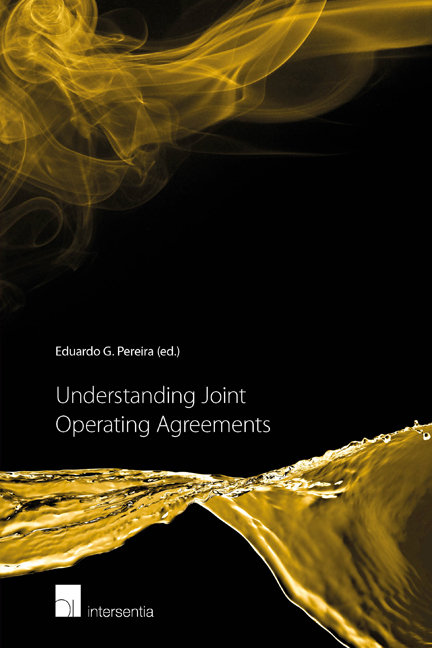Book contents
- Frontmatter
- Contents
- List of Abbreviations
- List of Authors
- Introduction
- PART I CONSIDERATIONS PRIOR TO ENTERING INTO A JOA
- 1 Bribery Laws and Compliance
- 2 The Relationship with Other Joint Venture Agreements
- 3 Unitisation and Unit Operating Agreements
- 4 Key Issues Relating to JOAs in Civil Law Countries
- 5 The Relationship between a JOA and a Host Government Instrument
- 6 Decommissioning Obligations, Practices and Procedures
- 7 Standards and Practices in JOAs across the Petroleum Industry
- 8 Modifying the Standard JOA to Accommodate Unconventional Petroleum Projects
- PART II SETTING UP A JOA
7 - Standards and Practices in JOAs across the Petroleum Industry
from PART I - CONSIDERATIONS PRIOR TO ENTERING INTO A JOA
Published online by Cambridge University Press: 15 December 2017
- Frontmatter
- Contents
- List of Abbreviations
- List of Authors
- Introduction
- PART I CONSIDERATIONS PRIOR TO ENTERING INTO A JOA
- 1 Bribery Laws and Compliance
- 2 The Relationship with Other Joint Venture Agreements
- 3 Unitisation and Unit Operating Agreements
- 4 Key Issues Relating to JOAs in Civil Law Countries
- 5 The Relationship between a JOA and a Host Government Instrument
- 6 Decommissioning Obligations, Practices and Procedures
- 7 Standards and Practices in JOAs across the Petroleum Industry
- 8 Modifying the Standard JOA to Accommodate Unconventional Petroleum Projects
- PART II SETTING UP A JOA
Summary
INTRODUCTION
Upstream oil and gas operations around the world almost inevitably involve a vertical relationship between:
(i) the state who controls and/or owns the petroleum and wishes to maximise commercial recovery from its resources; and
(ii) an upstream petroleum company (or a joint venture), which is seeking to explore and extract petroleum for profitable commercial production.
This usually involves the state granting the petroleum company the right to explore, exploit, appraise and produce petroleum by way of a licence, a production-sharing contract, a service contract or a combination or variation of any of these instruments (Petroleum Agreement).
A range of factors including regulatory, commercial and practical considerations defines the intricacies of each project and of most importance is the level of technical complexity and financial standing required for each Petroleum Agreement. In cases where a project involves less complex exploration, commonly in shallow depth drilling or onshore petroleum, a petroleum company may hold the Petroleum Agreement solely if it has the technology and the financial capacity to perform the obligations under the agreement on its own.
Most projects, however, involve complex exploration, deep drilling and/ or deep off shore production, raising the need to minimise the high cost and spread of the risks. For this reason, the rights granted under a Petroleum Agreement are hardly ever exercised by a single entity but rather by a number of petroleum companies who have agreed to jointly undertake a project and allocate responsibilities and profits amongst themselves.
This approach has led to the creation of the widespread concept of joint ventures (JVs) since the Petroleum Agreement itself does not deal with the sharing of rights and obligations as between the concessionaires/contractors. Whilst the central idea is to share costs, property and production (if successful) in proportion to their respective percentage interests, the synergistic nature of a JV allows participants to enjoy the financial standing and the skills of their associates.
- Type
- Chapter
- Information
- Understanding Joint Operating Agreements , pp. 109 - 144Publisher: IntersentiaPrint publication year: 2016



